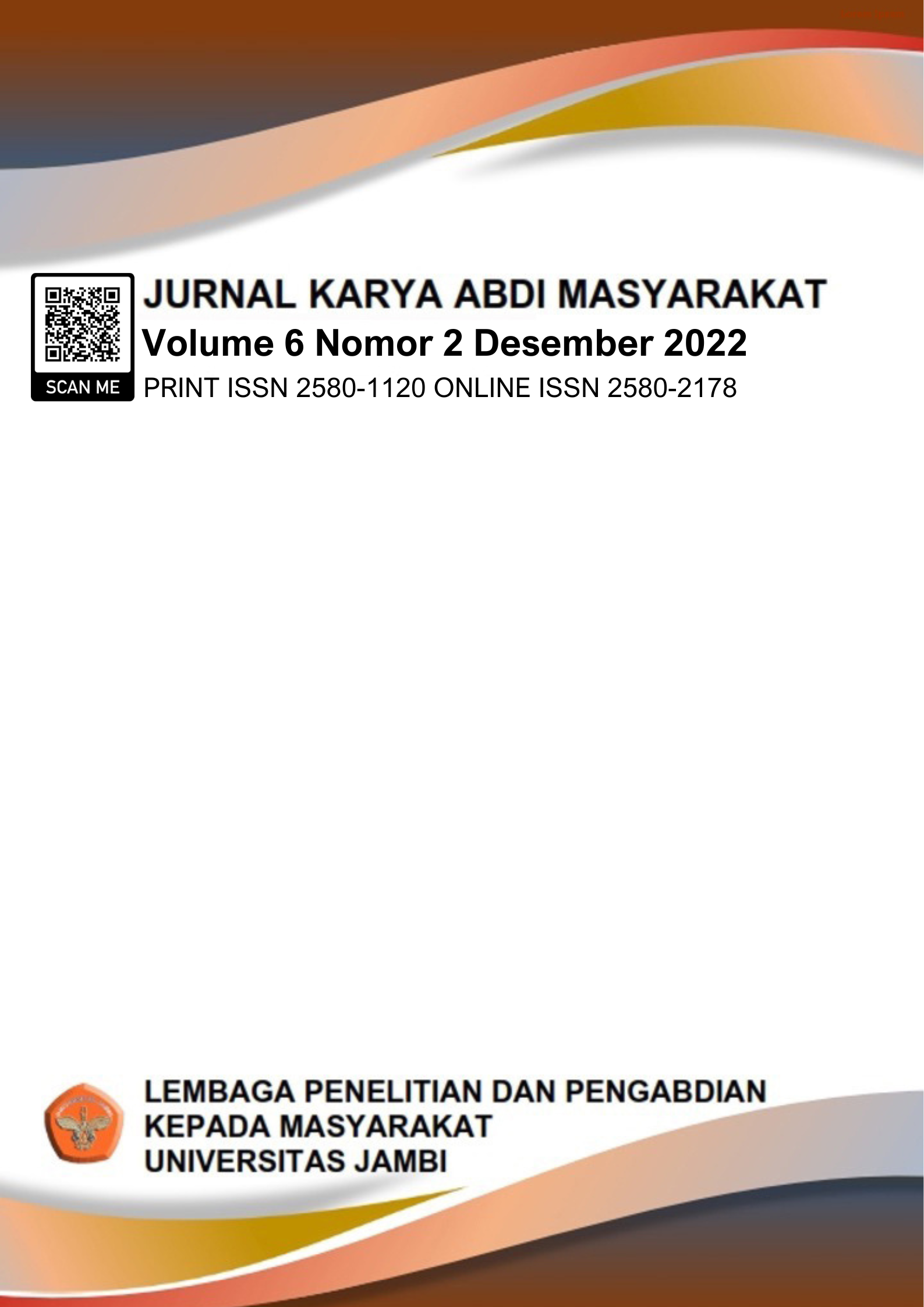Pengembangan Stroberi Lokal Organik Di Daerah Wisata Kayu Aro Berbasis Komlikoplusmol
DOI:
https://doi.org/10.22437/jkam.v6i2.20837Keywords:
Stroberi, komlikoplusmol, organik, Kayu AroAbstract
ABSTRAK
Wilayah Kecamatan Kayu Aro sangat cocok untuk pengembangan stroberi. Stroberi lokal sudah mulai langka dan tanaman yang masih ada hidup liar. Pengetahuan masyarakat tentang pengembangan budidaya stroberi lokal terutama di kelompok mitra PPM masih minim, pengetahuan masyarakat tentang pertanian organik belum ada, tanaman tumbuh tanpa pemupukan dan pemeliharaan yang tepat. Wilayah ini juga berpotensi untuk pengembangan tanaman kopi, limbah kopi dari hasil panen tidak dikelola dengan baik sehingga mencemari udara dan lingkungan, pengetahuan dan penerapan MOL dan komlikoplusmol sebagai pupuk organik limbah kopi pada budidaya tanaman stroberi organik belum ada. Solusi yang dilakukan dalam kegiatan PPM adalah penerapan IPTEK melalui kegiatan diskusi, pelatihan, pendampingan, praktek dan demplot. Lokasi kegiatan di Desa Koto Periang Kecamatan Kayu Aro. Kegiatan yang diterapkan adalah : pengolahan limbah kopi menjadi komlikoplusmol, pengolahan limbah kopi menjadi MOL, pelatihan, praktek dan demplot budidaya tanaman stroberi lokal secara organik yang memanfaatkan MOL dan komlikoplusmol, penanaman dilakukan secara vertikultur untuk menata lingkungan dan kelestarian lingkungan. Kesimpulan kegiatan adalah : produk MOL sebagai dekomposer dan komlikoplusmol sebagai pupuk organik yang dimanfaatkan dalam pengembangan budidaya stroberi dapat meningkatkan pertumbuhan, perkembangan dan produksi stroberi lokal yang sudah mulai langka, produk yang diperoleh adalah buah stroberi organik, adanya peningkatan penghasilan, kualitas dan kuantitas.
Downloads
References
Budiyani, N. K dan N.N. Soniari. 2016. Analisis Kualitas Larutan Mikroorganisme Lokal (MOL) Bonggol Pisang. Jurnal Agroteknologi Tropika 5(1): 63-72.
Dinas Pekerjaan Umum. 2020. Profil Kabupaten Kerinci Tahun 2016-2020. Pemerintah Kabupaten Kerinci.
Gunawan dan L. Winata 1996. Stroberi. Penebar Swadaya. Jakarta.
Juanda, J., I. Irfan, dan N. Nurdiana. 2011. Pegaruh Metode dan Lama Fermentasi Terhadap Mutu MOL
(Mikroorganisme Lokal). Jurnal Floratek 6: 140-144.
Ni’matillah, ZA., H. Ashari, R. Soelistyono dan N. Herlina. 2014. Pengaruh Macam Bahan Tanam pada Pertumbuhan dan Hasil Tiga Varietas Stroberi (Fragaria Sp.). Balai Penelitian Jeruk dan Buah Subtropika Malang. Jurnal Produksi Tanaman. Volume 2 Nomor 2.
Sutanto, R. 2002. Penerapan Pertanian Organik. Kanisius. Yogyakarta.
Tandisau, P., dan Herniwati. 2011. Prinsip dasar pengembangan pertanian organic. Buletin Nomor 5 Tahun 2011, Published: 26 April 2018. BPTP Sulawesi Selatan.
Downloads
Published
How to Cite
Issue
Section
License
Copyright (c) 2022 Trias Novita, Evita Evita, Jasminarni Jasminarni

This work is licensed under a Creative Commons Attribution 4.0 International License.
Please find the rights and licenses in Jurnal Jurnal Karya Abdi Masyarakat (JKAM).
- License
The non-commercial use of the article will be governed by the Creative Commons Attribution license as currently displayed on Creative Commons Attribution 4.0 International License.
- Authors Warranties
The author warrants that the article is original, written by stated author(s), has not been published before, contains no unlawful statements, does not infringe the rights of others, is subject to copyright that is vested exclusively in the author and free of any third party rights, and that any necessary written permissions to quote from other sources have been obtained by the author(s).
- User Rights
JKAM's spirit is to disseminate articles published are as free as possible. Under the Creative Commons license, JKAM permits users to copy, distribute, display, and perform the work for non-commercial purposes only. Users will also need to attribute authors and JKAM on distributing works in the journal.
- Rights of Authors
Authors retain the following rights:
- Copyright, and other proprietary rights relating to the article, such as patent rights,
- The right to use the substance of the article in future own works, including lectures and books,
- The right to reproduce the article for own purposes, provided the copies are not offered for sale,
- The right to self-archive the article.
- Co-Authorship
If the article was jointly prepared by other authors, the signatory of this form warrants that he/she has been authorized by all co-authors to sign this agreement on their behalf, and agrees to inform his/her co-authors of the terms of this agreement.
- Termination
This agreement can be terminated by the author or JKAM upon two months notice where the other party has materially breached this agreement and failed to remedy such breach within a month of being given the terminating party notice requesting such breach to be remedied. No breach or violation of this agreement will cause this agreement or any license granted in it to terminate automatically or affect the definition of JKAM.
- Royalties
This agreement entitles the author to no royalties or other fees. To such extent as legally permissible, the author waives his or her right to collect royalties relative to the article in respect of any use of the article by JKAM or its sublicensee.
- Miscellaneous
JKAM will publish the article (or have it published) in the journal if the articles editorial process is successfully completed and JKAM or its sublicensee has become obligated to have the article published. JKAM may conform the article to a style of punctuation, spelling, capitalization, referencing and usage that it deems appropriate. The author acknowledges that the article may be published so that it will be publicly accessible and such access will be free of charge for the readers.








